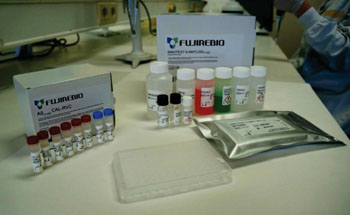Small Molecule Detects Alzheimer's Disease at Early Stages
By LabMedica International staff writers
Posted on 27 May 2015
A high level of a small molecule called D-serine have been identified as associated with cognitive decline in Alzheimer’s disease (AD) and holds the potential to represent a novel and effective biomarker for AD. Posted on 27 May 2015
Currently, diagnosis of probable AD is based on neuropsychological testing, fluid biomarker assessment and brain imaging, but diagnosis of the earliest stages of AD, before major brain damage takes place, is still challenging. In order to improve diagnostics and to allow treatment to be initiated at the earliest possible stage, there is an urgent need to incorporate biomarkers capable of detecting disease onset or at early stages.

Image: The INNOTEST enzyme-linked immunosorbent assay kits for Alzheimer disease biomarkers (Photo courtesy of Fujirebio-Europe).
Scientists at the Federal University of Rio de Janeiro (Brazil) and their colleagues obtained postmortem tissue samples from 17 cases with a neuropathological diagnosis of AD confirmed for the presence of pathological hallmarks by an experienced neuropathologist, and 12 cases without neuropathological changes. Cerebral spinal fluid (CSF) was obtained from 21 patients with probable AD and 10 healthy control subjects and nine patients with normal pressure hydrocephalus who were recruited.
D-serine, L-serine and glycine levels in tissue homogenates, CSF and culture media were measured by high-performance liquid chromatography. CSF levels of p-tau, total tau protein and amyloid beta (Aβ1-42) were measured using commercially available enzyme-linked immunosorbent assays (ELISA INNOTEST p-tau181, INNOTEST htau, INNOTEST β-amyloid (1-42) kits, respectively; Innogenetics, Gent, Belgium). Quantitative reverse transcription-polymerase chain reaction (PCR) protocols were performed using specific primers for serine racemase (SR).
By looking at postmortem tissue from AD patients and matched controls, the team found that D-serine is abnormally high in hippocampus and cortex, brain regions severely affected in AD. They further found that increases in D-serine could be caused by the accumulation of amyloid-beta oligomers, toxins known to play a central role in AD. Their main discovery, however, was that D-serine levels were elevated in the CSF of probable AD patients who already display early clinical symptoms. Currently, definite AD diagnosis is only possible after pathological investigation of postmortem brains, and the lack of an effective early AD biomarker precludes efforts to halt or reverse disease progression.
The authors concluded that by including D-serine measurements into an amyloid-tau score (IATI) assists in AD diagnosis. Incorporation of D-serine measures into IATI remarkably improved diagnostic sensibility and specificity, indicating that D-serine could indeed be added to a panel of biomarkers aimed at early detecting AD. The study was published on May 5, 2015, in the journal Translational Psychiatry.
Related Links:
Federal University of Rio de Janeiro
Innogenetics













